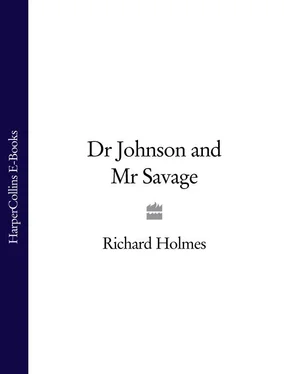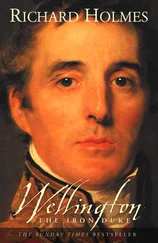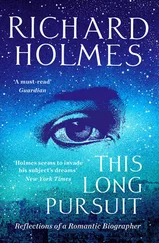So Johnson, far from using original sources or research, was basing the first section of his biography on a partial and secondary source, the ‘Newgate’ booklet, whose proclaimed aim was to exculpate Richard Savage from his crimes.
For the second part of Savage’s Life , from 1728 onwards, Johnson would work in another way. Not only would he use his own impressions, often brilliantly perceptive and blackly humorous. He would incorporate no less than forty pages of quotations from Savage’s poetry and letters (some twenty per cent of the entire text). 9 But for the crucial beginning of the biography, dealing with Savage’s mysterious childhood and shadowy early career to the age of thirty, Johnson very largely accepted the ‘Newgate’ version of 1727. He postponed any serious attempt at psychological enquiry or historical research until later. He opened for the defence, with the materials on hand.
Why did Johnson do this? Laziness, or deadline pressure, are hardly sufficient explanations. Johnson took his time and he wrote con amore of a friend who had meant something vital in his own escape to London and launching of a literary career. He was well aware, too, of the perils of biographical bias. He recalled in The Rambler his own situation in 1743: ‘If the biographer writes from personal knowledge, and makes haste to gratify the public curiosity, there is danger lest his interest, his fear, his gratitude, or his tenderness, overpower his fidelity, and tempt him to conceal, if not to invent.’ 10 Perhaps he believed in retrospect that he had been, to some degree, overpowered by the Savage legend as set forth in the ‘Newgate’ booklet.
What I think happened was this. Johnson was caught up in its romantic drama. He responded overwhelmingly to the picture it presented of Savage as a man on trial for his life, a victim of society, and particularly as a victim of one woman’s cruelty. For this is the central argument of the ‘Newgate’ version, and one that Johnson amplifies with passion, and even something close to fury, in his own Life.
While relying on the bare outlines of the ‘Newgate’ version, Johnson transforms the first thirty years of Savage’s life into an extraordinary and emotional piece of story-telling. It is highly compressed, occupying only a quarter of the overall biography, and astonishingly sketchy with facts and dates. Yet it grips the reader from the first moment with its drama and pathetic images of rejection and persecution.
Richard Savage is introduced as a tragic outcast from eighteenth-century society, not merely disowned by his supposed mother, Lady Macclesfield, but ‘with an implacable and restless Cruelty’ pursued and persecuted by her ‘from the first Hour of his Life to the last’. 11
Johnson never seriously questioned ‘Newgate’s’ assertion that Savage was the illegitimate child of Lady Macclesfield. He did not even bother to examine the documentary evidence, or question those who might have seen it, like Aaron Hill or Lady Macclesfield’s nephew, Lord Tyrconnel. His view of Savage’s wayward character and misfortunes is grounded on the supposed injustice he suffered throughout his life when that claim was consistently denied, for whatever motives, by Lady Macclesfield.
He accepted Savage as a rejected child, flung out from his rightful place in society, and presented this with all the pathos at his command. ‘Born with a legal Claim to Honour and to Riches, he was in two Months illegitimated by the Parliament, and disowned by his Mother, doomed to Poverty and Obscurity, and launched upon the Ocean of Life, only that he might be swallowed by its Quicksands, or dashed upon its Rocks.’ 12
The image of the child launched helplessly upon the waters, like young Moses in his basket of reeds, is powerfully emotive. It indicts not merely the mother but society as a whole (represented by Parliament). Johnson was later to develop this social indictment with great effect.
He pursues this interpretation to far greater lengths, and with even greater biographic daring, or recklessness, in his portrait of Lady Macclesfield herself. Here again he accepts the ‘Newgate’ version of the facts without question, and without investigation, and he intensifies it to an extraordinary degree. No attempt is made to give the objective details of her life, her family circumstances, her social connections or even her age. She is presented simply as a type of the worthless aristocratic woman: capricious, voluptuous, vindictive and relentlessly cruel. Johnson is so roused by this image that he openly courts a charge of libel.
This Mother is still alive, and may perhaps even yet, though her Malice was so often defeated, enjoy the Pleasure of reflecting, that the Life which she often endeavoured to destroy, was at least shortened by her maternal Offices; that though she could not transport her Son to the Plantations, bury him in the Shop of a Mechanick, or hasten the Hand of the publick Executioner, she has yet had the Satisfaction of imbittering all his Hours, and forcing him into Exigencies, that hurried on his Death.’ 13
It can be suggested that this figure is a fictional rather than a biographic creation. Johnson seems to have built on Savage’s fantasies in The Bastard and The Wanderer and unconsciously added something of his own. Throughout the Life he identifies strongly with Savage’s obsessive anger and feelings of rejection by a powerful woman. There is an undercurrent of vengefulness, if not of misogyny, in his portrait of Lady Macclesfield which seems uncharacteristic of the later Johnson and which we can only explain by his own romantic disappointments, surely aggravated by his physical grotesqueness and sexual awkwardness as a young man. At no moment is he prepared to consider events from Lady Macclesfield’s point of view: she is always Savage’s persecutor, a figure of ‘motiveless malignity’, torturing him for her sport. Again and again he calls her ‘unnatural’, like Lady Macbeth; and describes her as ‘outragious and implacable’, as if she was the force of destiny itself. 14
At the time Johnson wrote, in 1743, the real Lady Macclesfield was a rich, sad and reclusive widow in her late seventies, living alone in a small house in Old Bond Street. She had lost her title through divorce, and was known by the name of her second husband (by then deceased) as Mrs Anne Brett. Her whole life had been shaken by domestic unhappiness and public scandals.
Born in Shropshire in 1668, the daughter of Sir Richard Mason, a Clerk Comptroller in the royal household, with a house in Whitehall, she had made an early and disastrous marriage to a young Whig firebrand, Viscount Brandon, when she was only fifteen. Brandon was a violent and dangerous character who had killed a boy in the London streets when drunk, and was later twice imprisoned in the Tower for treason.
The marriage broke down in the first few weeks, and by the age of seventeen she was separated and living with her sister Lady Brownlow at Beaufort House, where she remained for the next twelve years, fearful of her husband’s rages. She none the less pleaded on her knees before the King, in order to obtain Brandon’s pardon after the Rye House plot, when he had been implicated in an assassination attempt on James II.
In 1694 her husband inherited the title of Lord Macclesfield, though no reconciliation and no children were forthcoming. Two years later Lady Macclesfield, now approaching her thirtieth birthday and desperate for affection, fell in love with Richard Savage, the Fourth Earl Rivers. It was another disastrous choice. Rivers was well known as a gambler, rake and political intriguer, and was renowned for his amours. He kept a large establishment, with gardens, at Rivers House, Great Queen Street, in the parish of Holborn. Lady Macclesfield bore him two illegitimate children, a girl and a boy, in rapid succession and great secrecy. Lord Macclesfield, hearing rumours of this but unable to establish proof, began divorce proceedings in the House of Lords on 15th January 1698.
Читать дальше












